Mushihimesama Futari Ver 1.5 (Xbox 360) Review
By David Kelly  14.10.2016
14.10.2016
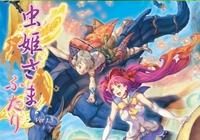
The 2D shooting game has enjoyed a recent mini-revolution of sorts, the charge being led by small Japanese developers initially supporting arcade cabinet releases in small numbers before progressing to mainstream consoles, the Steam platform, and mobile devices, and the genre has developed quite a bit from its simple and pure origins. Cave Inc. has been far and away the most prolific and successful of these developers, and Mushihimesama Futari (or Mushi Futari as it will be referred to from here on in) is one of the team's flagship titles. Being a modern 2D shooting game, it belongs to a sub-genre called "bullet hell" that has grown to become the typical style of game now released by shmup developers.
Mushi Futari is a typical modern 2D shooting game that features small collision boxes, bombs, bullet cancelling, aimed and patterned bullets and slowdown by design. If those terms are unfamiliar then it is recommended to read our "Modern 2D Shooting Game Primer" article before continuing, as it will help put this review into context.
There are two characters to play with, Reco and Palm, each with two different weapon configurations and movement speeds (called "Normal" and "Abnormal") that the player must choose at the start. These variations make the game feel quite different to play and add a considerable amount of replay value to a title that is already jam packed.
There are five levels and there is no second loop, or even a secret final level for those who reach it without continuing. Instead of those genre mainstays, Mushi Futari has several different gameplay modes, and with the character and shot variations, they deliver a bewildering amount of play options that take the game's seemingly miserly five levels, and twists and warps them into a package that is very generous in its gameplay breadth and depth.
The basic mode is called "v1.5" - this name comes from the fact that it is a refined version of the original arcade game, which had some issues that were fixed in v1.1, and finally refined to the developers' and arcade players' satisfaction in v1.5, and so is considered the definite version of the game.
There are three main sub-modes called Original, Maniac and Ultra, offering different gameplay scoring rules and different styles of bullet pattern, varying in speed and density. The disc also offers an arrange mode with significantly different gameplay rules, and a novice mode, which offers beginners a relatively gentle introduction to modern shooting games. Both arrange and novice modes also have Original, Maniac and Ultra sub-modes.
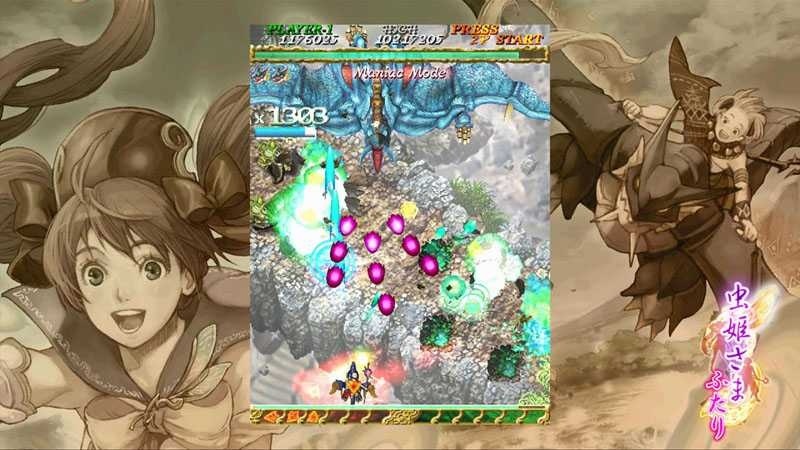
Then there is DLC. There is the option to purchase Black Label mode, which is yet another way to play. This was a remix of v1.5 and had a limited release in Japanese arcades, and is considered by some fans of the genre to be a more entertaining game. You still have the two characters, but the Normal and Abnormal settings have been abandoned. Original and Maniac sub-modes are still available, but this time, Ultra mode is replaced with the foreboding sounding God mode, the final boss of which features in a famous YouTube video entitled the "The hardest video game boss ever." Black Label mode ups the amount of firepower of the enemies and the player to even more ridiculous screen filling levels, but somehow the developers have skilfully retained the beautifully balanced gameplay. The Black Label enemy and bullet patterns are re-arranged, and it feels like playing a remix of the original game.
Across all modes and sub-modes the player can select Normal mode, which allows continues, or Score Attack mode, which doesn't, but uploads high scores to online leaderboards for comparison against world records and friends' attempts. Most modes also support two-player simultaneous play, which is highly entertaining due to the general level of chaos.
On top of the usual modern shooting game features, Mushi Futari has a set of scoring mechanisms that form a delicate balance of risk and reward. In most modes, you have two forms of attack with associated ship movement speeds. Broadly, it gives the choice of switching between weaker wide attacks and faster movement, or stronger focused laser attacks with slower movement.
The laser attack is particularly useful against the large bosses, as it allows for a more powerful focused attack, while the slower movement speed allows the player finer control to navigate through the complex bullet storms that the bosses generate. However, there are plenty of occasions when the laser attack is also very useful on other occasions.
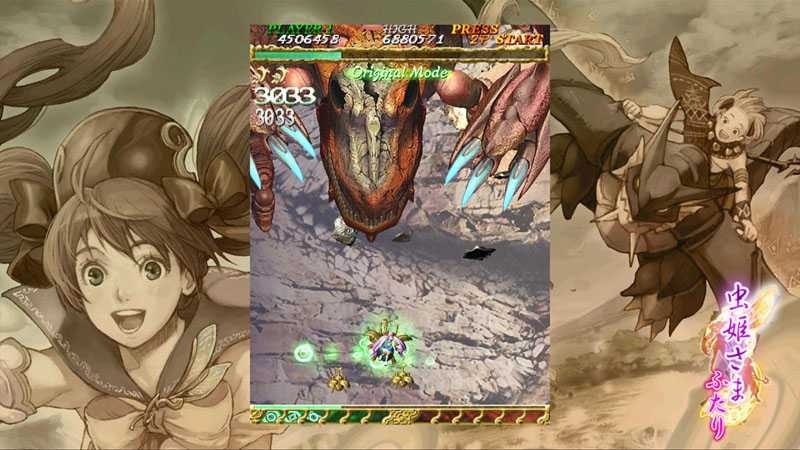
Shooting enemies release gems that can be picked up for extra points. There is a gem counter on the screen showing how many have been collected. As this total climbs, the colour of the digit display changes between green and blue. When green, the wide shot produces more gems, but when blue, the laser will deliver more gems, requiring a player who wants to maximise the score to switch between the two firing modes, while keeping one eye on the gem counter and another on the enemies. The gem total has an impact on the game's difficulty, so players have to balance between greed and safety as they play.
Gems will automatically move toward the player when using wide shot, but when using laser, they have to be manually collected, which also has to be taken into consideration when playing for score. There are optimal weapon utilisation scenarios for survival in different parts of the game, so this challenges the player to strike the balance between surviving and scoring.
This all makes for a very enjoyable experience layered on top of the basic gameplay. These basic scoring rules are riffed upon across the various game's sub-modes, and there is plenty for the player to learn and experiment with, as they can result in vastly differing tactics and scores in the different sub-modes.
There are extensive display options. Mushi Futari can be played in its original resolution or in HD mode, and the game can also be rotated to fit onto a screen turned onto its side to make the most of the display area (called TATE mode by aficionados). The non-HD mode has various options to optimise the display on a CRT. There is also a host of options that adjust and tweak various technical aspects of the game display to emulate CRT effects on modern displays, which will be bewildering to those who will be happy with the default settings, which are by and large perfectly fine.
The display options also allow the player to create portals showing zoomed in portions of the game display and place them anywhere they like on the screen - one application of which could be to create a second gem counter display located so that the player can more easily keep track of it.
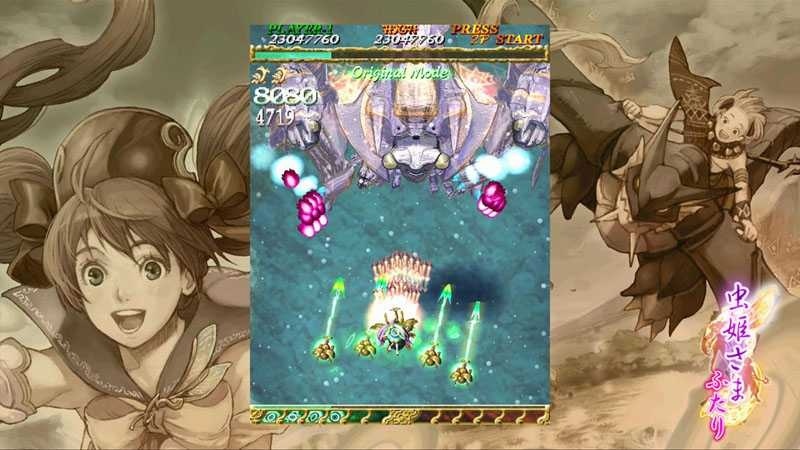
There is also an excellent training mode, which lets the player try each level and boss individually. It features a host of options that allow for recreating the conditions of any simulated game run. Recording and playback of games is supported on top of this. You can even slow the playback down to see just exactly how you managed to lose that life. This is a comprehensive package, which will be a hard act to follow.
The array of modes on offer here means that all player skill levels from novice to God (!) are supported, and the breadth of gameplay options means that this will last a fan of the genre for years.
The theme of the game is a fantasy setting, with the player represented by a girl (Reco) riding on a flying beetle, or boy (Palm) riding on a dragon, shooting enemies based upon dinosaurs, dragons and ground-based and flying insect designs within a range of beautifully designed environments. The characters' collision boxes are small and in their exact centre, and are brightly coloured to aid bullet pattern navigation.
Everything has been drawn with a great amount of imagination, graphic design and flare. Overall, the 2D hand drawn graphics are very pleasing and are backed up by a responsive set of configurable controls that work equally well with either a standard pad or arcade joystick. The soundtrack is astounding and definitely adds to the overall experience, varying from uplifting beautiful tracks to deep menacing tunes for the boss fights that are designed to build to a crescendo the closer you get to defeating them.
There is a backstory, but it is unintelligible as it is portrayed in Japanese text, but as a rule, shmup storylines are a pretty disposable part of the genre.
Mushi Futari was released as a region free title and therefore can be played on any Xbox 360 console. A few of the menus and messages are in Japanese, but this isn't significant as, for the most part, they are in English, so it is quite accessible to those who are not conversant in Japanese.
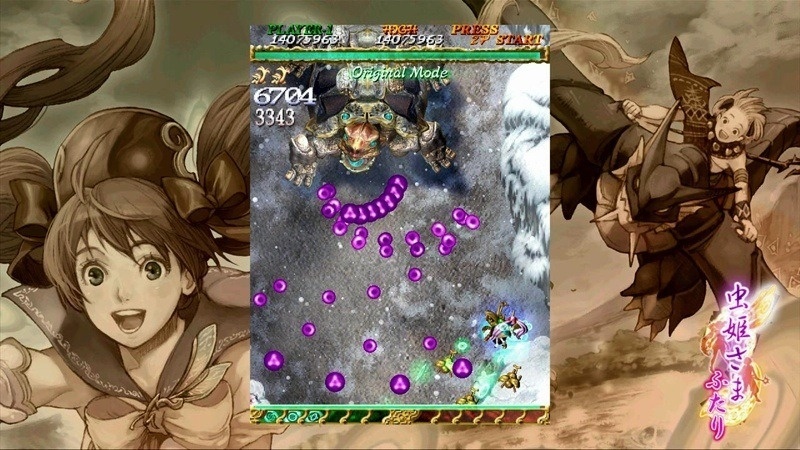
Cubed3 Rating
Exceptional - Gold Award

Mushihimesama Futari is faultless. Shooting game fans need to pick this up, as it is among the best ever produced, if not the most entertaining ever. If the reader hasn't played a modern shooting game and wants to try one, then this is the place to start.
Comments
Comments are currently disabled

 Sign In
Sign In Game Details
Game Details
 None
None  None
None  Out now
Out now  None
None  Subscribe to this topic
Subscribe to this topic Features
Features







 Top
Top

